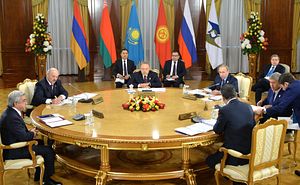Earlier this month, Veronika Nikishina, the trade minister for the Eurasian Economic Commission Board, declared that the free trade agreement (FTA) signed between the Eurasian Economic Union (EEU) – which comprises Russia, Belarus, Kazakhstan, Armenia and Kyrgyzstan – and Vietnam will come into effect on 5 October 2016. She was speaking at the sidelines of the second Eastern Economic Forum held in Russia’s Vladivostok, from 2-3 September 2016.
This formal declaration signals the EEU’s burgeoning interest to further economic ties with Asia-Pacific, in particular, ASEAN.
Under the terms of the agreement, the EEU will abolish import duties on 88 percent of goods with immediate effect. The remaining tariffs will be gradually reduced within 10 years. Goods that will enjoy tariff-free access to consumer markets within the Eurasian Union include agriculture produce, processed food, metals and construction materials.
In the spirit of reciprocity, Vietnam will eventually eliminate import duties on 91 percent of goods originating from the EEU. Products such as meat, dairy products, tinned fish, flour, cereals, mechanical equipment, petroleum products and steel will enjoy zero-tariffs. Automobile industry companies will also be given exclusive access to the Vietnamese market.
This historic FTA bears much significance for Vietnam and the region. Touted as the next manufacturing hub of the world, the FTA will provide Vietnam-based manufacturers with access to a host of essential resources such as oil, gas, iron and steel, further augmenting Vietnam’s position as an emerging manufacturing powerhouse. The agreement will also open Vietnam to a market of 175 million people, with an estimated GDP of $2.5 trillion.
Likewise, member states of the EEU look set to benefit from the FTA by using Vietnam as a gateway into the promising ASEAN market. As the largest market in the bloc, Russia stands to gain the most from this agreement. Moscow and Hanoi have signed an agreement to produce Russian cars in Vietnam. These made-in-Vietnam Russian cars will enjoy tariff-free access to the rest of ASEAN as part of the free trade area between member states.
Looking beyond Vietnam, the Eurasian Economic Union has set its sights on expanding ties with other ASEAN member states. In particular, Singapore and the EEU will conduct a joint feasibility study on a free trade deal. Earlier this year, Singapore’s Minister of State for Trade and Industry Mr Koh Poh Koon visited all five states to identify possible opportunities for economic collaboration.
Cambodia and Thailand are also reportedly in talks to deepen trade relations with the EEU. If successful, the FTAs will bring significant opportunities to a fast growing economic region.

































